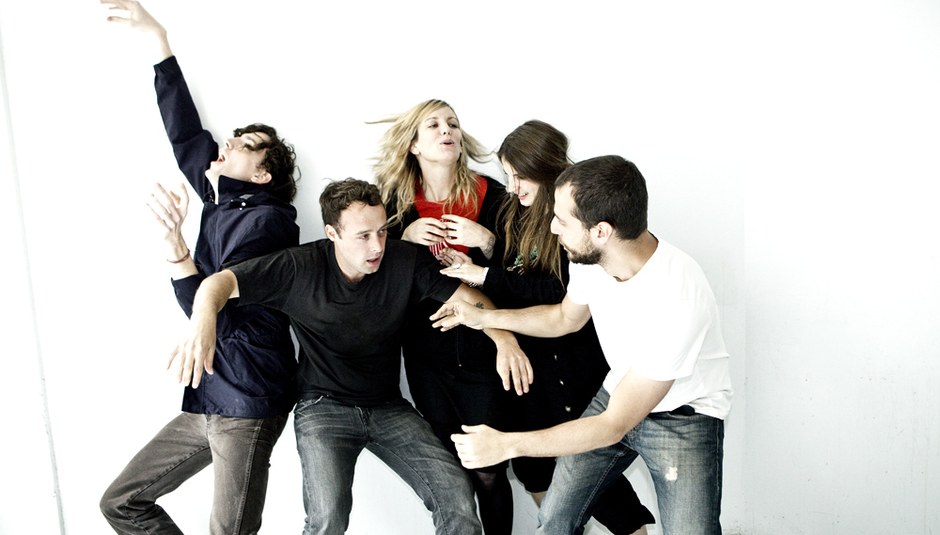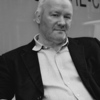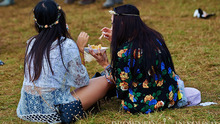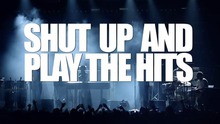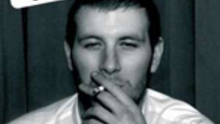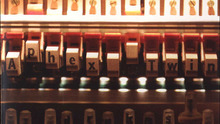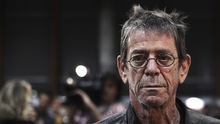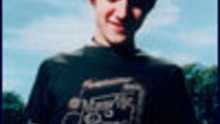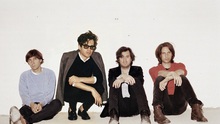Luke Temple created Here We Go Magic initially as an outlet for his own musical experiments. The Brooklyn based singer/songwriter's first self-titled long player came out to a wealth of critical acclaim last year. Suitably impressed by the record's reception, Temple then went about extending the project to that of incorporating a full band, culminating in the five-piece that has currently been wowing audiences around Europe these past weeks and the second Here We Go Magic album Pigeons, out last month on the Secretly Canadian label.
With a never ending tour schedule that takes them right through November, including some UK shows later this month with Broken Social Scene, DiS managed to speak to Here We Go Magic's main protagonist during a rare break between rehearsals and live shows.
Drowned In Sound: You've just played a storming set at Primavera. How was it for you?
Luke Temple: It was great, definitely one of our better shows so far. It was pretty much everything we could have hoped for, playing in front of that many people in a festival vibe.
DiS: By way of contrast, I saw your show at The Great Escape in Brighton a few weeks earlier which seemed to be littered with technical problems.
LT: That was a nightmare. Both shows at Great Escape were awful, but we had to get them out of the way I guess. There were a million things that went wrong with that whole situation. Most of the frustration happened before we even played a show. By the time we got out on stage we had this real pent up vibe and it just kind of unravelled from there. It reminded me of South By Southwest, where a lot of bars that don't normally put on live music all of a sudden become live music venues and they can't cope with the sound or the amount of people in the venue, and then there's problems with parking...we had to load-in from around the corner from the venue but then at the same time we're being told we have to move our vehicle immediately because it's illegal to park anywhere in the vicinity of the venue and then they tell us we have to load out as soon as the last song finishes. It was just total mayhem, and isn't the most conducive of atmospheres for performing in front of an audience.
DiS: The early reviews for Pigeons have been very positive. Were you expecting that kind of response?
LT: I guess I was, yeah. I've only read a couple of reviews, but they've been nice so far so hopefully it will continue.
DiS: Pigeons is also your first record working with a full band. How did you find working with four other people compared to the first album, which was entirely of your own doing?
LT: There are a lot of differences to contend with. For a start, there's an element of compromise that is inherent with working in a democracy which was something I had to get used to. At the same time, there was a level of trust established between us that was great because it meant I didn't have to worry about dealing with everything. I could let it go into the hands of the others safe in the knowledge they were going to do something we all liked. The element of communication between us musically was another experience I'll never forget. Because we had a timescale to record the album it meant we had a lot of late night jams where we got pretty psychedelic with each other and then songs kind of arrived out of that, which was a huge difference to anything I'd been involved in before. The whole process of getting to know who we are as a band developed from there. We'd only been together as a band three or four months so we were just kind of figuring out what Here We Go Magic the band were about at that point.
DiS: Were any of the songs already in place before the other band members joined, or did the whole album emerge from practice sessions and jams?
LT: A few of them we'd been playing live beforehand - 'Surprise' and 'Collector' - but the rest were written during the recording sessions. Most of Pigeons was spontaneously created over time while we were putting it together.
DiS: The differences in sound between the two albums could almost be perceived as coming from two different artists, so how did the other members feel when you carried on using the name Here We Go Magic? Were there any concerns among them that they'd be seen as little more than Luke Temple's backing band for instance?
LT: I don't know so much because I don't think that's something they'd ever convey to me. But I don't think so, I believe we all kind of agree that this is a band as much as any other band. 90% of the time there's still a principal songwriter and then the band brings their own idiosyncratic ways of playing to it and you get that whole band sound, and that's what we are now. We tried to make it pretty clear with whatever press releases we put out for this record that we're band now rather than just my solo project. Financially, we share and split everything equally and psychologically I think that really helps with everyone feeling included on an equal footing.
DiS: That's quite interesting as normally the principal songwriter or founder member of a band would normally take the lion's share of any financial reward.
LT: I figured it could only help morale, and the reality is that not too many people make much money on record sales anyway, so the majority of our income will occur through playing live and whether or not you own the publishing rights to all of your songs you still split the proceeds of any money you make from playing live shows between each and every member. I'm not in this to get filthy stinking rich; I'm in this to enjoy myself and enjoy the people I'm working with, and I want them to be enjoying themselves too. That's more important to me. There's something I once read about The Strokes that Julian Casablancas writes pretty much every note of their music yet splits everything evenly among the other members of the group, and I think that's one of the main reasons those guys have been together for over a decade and still get along really well. It's almost like everyone has an equal share in an investment, which means everyone in turn assumes more responsibility.
DiS: I guess that also helps create the environment of trust you mentioned earlier, which must be a great boost for the creative process as a whole?
LT: 100%. People are more willing to go for broke. We've given up our whole lives for this, and I think musically we have more opportunities with this than any other projects we've been in before. At the same time, we're also probably worse off financially than we've ever been at any other time in our lives! Because this is something that we all own, we're willing to put everything on the line. If this was just a singer/songwriter project with me hiring a band, we wouldn't be able to afford to do this.
DiS: If there was anything you could change about the first record such as re-record some of the songs on there with a full band, would you?
LT: No, I wouldn't do anything different with the first record. That was a completely holistic process. I recorded every night in my room by myself. It was a very internal experience and all the environmental constraints that were involved - I was living in an apartment building at the time so had to play very quietly - helped to create the sound of that record. It couldn't really have been made in any other way.
DiS: You are still playing several of those songs with the full band. How do they interpret each song and what do they bring to the live versions?
LT: They take on a different character with the band for sure, but that's the way I feel about playing live anyway. I feel that the music should constantly evolve from show to show, almost becoming a new experience every time. We leave a lot of room for our music to breathe and hopefully go in whatever direction we feel it should at the time, and I think that transcends itself to the audience who in turn know they'll never get the same kind of show twice in succession from our band.
DiS: Listening to parts of Pigeon - 'Collector' being one song that definitely springs to mind - it sounds like a lot of what was actually recorded live. Was that the case?
LT: 'Collector' we recorded live. There are a few overdubs at the end such as vocal harmonies but the version on the album was only the third take of that song. Trying to make something perfect is the most unnatural thing there is. Everything's flawed, one thing moves along to the next and so on. To try to create any kind of music or art that is flawless is just a myth, and one that could never exist. To me, for something to sound natural there has to be some kind of communication going on in real time between people if it is an ensemble based arrangement. There needs to be that intangible connection where by the mistakes can be taken with a pinch of salt because overall, the bigger picture feels good. There are mistakes all over that song in particular, but those are easy sacrifices to make for the good of the recording process and the band in general.
DiS: You mention that there are mistakes on 'Collector', while many of the songs were only written and recorded during the actual process of recording. As you play the songs live more often, have any of them changed from how they sound on the album?
LT: Yeah. A lot of them tend to play louder and a bit denser. There's a lot more energy involved when we play live, and I think the ones that were pieced together for the record have definitely taken on a more dynamic life of their own when we play them. I think that's one lesson we have learned from this process, and the next record we are aiming to record completely live. The basic elements for sure - vocals even - and then any incidental sounds or harmonies we'll overdub at the end.
DiS: Again, that's quite interesting as you don't hear of many artists recording their vocals live in as few takes as possible.
LT: From an engineer's standpoint it's a nightmare because you don't have as many options recording them live but the general feeling and intensity is obviously different when someone records live. That's why we tend to record, engineer and produce ourselves. We don't have to deal with the professionals telling us what we can and cannot do.
DiS: Would you consider letting an engineer produce or remix one of your records in the future?
LT: I haven't really thought about it too much. The only producer I think I'd be open to working with at this point would be Brian Eno because his whole method is about constantly redefining himself and whatever project he's working on. He doesn't have any dogma or definitive rules. He's always trying to create interesting problems and then by getting himself out of that problem the end result is usually a bi-product that you'd never have been able to predict in the first place, which I guess is also the way that I like to work.
DiS: What do you think someone like Brian Eno would have made of the more primitive recordings on your first album?
LT: I wonder sometimes! I think maybe he would see it as being slightly passe to go with the lo-fi route because that's already been done. He's such a forward thinker so he probably wouldn't have found it that interesting to be honest. A lot of people from my generation are going back and listening to older records, finding more depth rather than just the sonic effects of the recording. He'd be the first one to criticise anything that sounds remotely like him, and Here We Go Magic is filled with Eno-esque sounds.
DiS: You've already mentioned recording the next album live. Are there any works in progress at present which may end up on that record?
LT: I'm always floating around with new ideas, some of which will be forgotten and fall to the wayside by the time it comes to recording the album. By the time we get around to making the record, I'll probably have fifty or sixty songs that could go into it but by the end I would have dispersed with forty of them or maybe even more. Then I'll go back and listen to a bunch of four-track tape demos that I've done and listen and work on improving some of those.
DiS: Although both albums were generally written and recorded over the same period of time, is this how the ideas for songs on each record came about previously?
LT: Not really. The first one was written and recorded entirely simultaneously, whereas Pigeons was a mix between songs I already had and spontaneous arrangements written during recording. I like the idea of lighting in the studio. I deal well with pressure. It allows me to not be overly critical because I don't have enough time. That's a good way to go because usually, all original impulses are the best.
DiS: Are there any timescales or deadlines as to when the next record will come out?
LT: When we did Pigeons we knew we had two months so I would write a song every morning from scratch and I'd spend an hour or so on it and then I'd show it to the rest of the band and we'd start recording it until about lunchtime, then after that we'd go back to older stuff and work on that a little bit more and then start over again the next day. Slowly and surely you kind of chisel away at something then after two months we had a record. I don't see writing music as being that difficult; it's more a case of just getting it out of the way. I don't take it that seriously or put it on any kind of pedestal. It's just something that happens and either you enjoy it and it makes you feel good or it doesn't and you leave it behind. It's a little snapshot in time - art's not the be all and end all, it's just little commentaries along the way. Whether it makes you remember about a certain feeling or not, that's when it functions. If it's empty that's usually when the artist is more concerned about creating something that sounds like something else or fits in with a certain genre. It's self-referential. When I'm making music I don't set myself any time frames or targets, I just tend to react in my own way.
DiS: Are there any more singles planned off Pigeons?
LT: 'Old World United' is going to be coming out, and I think maybe 'Casual' will be released later on this year as well. We have videos in mind for a whole bunch of stuff and we have people brainstorming and making that process happen. As well as those two there'll be a video for 'Surprise'...
DiS: What about 'Hibernation'? To me that sounds like the most obvious choice of single on the record?
LT: I don't know. There are certain songs that we really want to be singles and then like with 'Surprise', a friend of mine who's an animator said he really wanted to do a video for it so that's how we decided on that one. If someone approaches us with an idea for a video for another song then we might try and make it happen. It gets a little more complicated here because there's money involved. It's so funny that people's opinions on songs vary from person to person. I guess we should have our street teams out taking statistical surveys on what the next Here We Go Magic single should be!
Here We Go Magic can be seen at the following shows & festivals:-
June
26 Glastonbury Festival (The Park & Q Queens Head stages)
27 London Hyde Park Calling (w/Paul McCartney)
28 London Serpentine Sessions (acoustic stage w/Grizzly Bear)
29 Nottingham Rescue Rooms (w/Broken Social Scene)
30 London The Forum (w/Broken Social Scene)
July
2 Glasgow King Tut’s
13 Bristol Thekla
15 Leeds Brudenell Social Club
16 Suffolk Latitude Festival (Obelisk Arena)
September
10 Dorset End Of The Road Festival
11 Isle Of Wight Bestival

